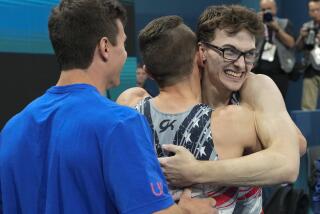WINTER OLYMPICS : Orser Satisfied to Be Third After Figures; Boitano Second
- Share via
CALGARY, Canada — As an observer once said about the tedious compulsory figures, the only thing that lasts longer and is more uncomfortable is pregnancy.
The first phase of the Winter Olympics men’s figure skating competition began Wednesday at 7 a.m. in the Father David Bauer Arena and ended eight hours and six minutes later. Required to perform three figures, each of the 28 skaters was in front of the judges for about two minutes.
The challenge for the skaters did not come so much from the competition as much as it did from trying to find something to occupy their time for the other eight hours and four minutes.
Canada’s Brian Orser, the 1987 world champion and the favorite for the gold medal here, returned to his room at the athletes’ village between the first and second figures and listened to a relaxation tape of wildlife sounds recommended to him by Dr. Peter Jensen.
Between the second and third figures, Orser went with Jensen to a soccer field behind the arena, where they talked about the skater’s new restaurant in Toronto and were warmed by the sight of the Olympic flame across the street at McMahon Stadium.
It was a satisfying day for Team Orser. Although the Canadian is in third place behind the Soviet Union’s Alexander Fadeev and the United States’ Brian Boitano after the compulsory figures, which count toward 30% of the final score, Orser is in a significantly better position entering tonight’s short program than he was four years ago at the Winter Games in Sarajevo, Yugoslavia.
Orser won the short and long programs in 1984, but he could not overcome his ninth-place finish in the compulsory figures and settled for the silver medal as the United States’ Scott Hamilton won the gold.
After also finishing second in the next three world championships--to Hamilton in 1984, Fadeev in 1985 and Boitano in 1986--Orser began to wonder if he would ever stand on the top level of the victory stand. That is when he began working with Jensen.
Orser has an eight-person “support staff.” Almost everyone else refers to it as an entourage, but he hates the word. Team Orser consists of his coach, his masseuse, his choreographer, his costume designer, his nutritionist, his financial manager, his public relations agent and his psychologist. The psychologist is Jensen, the person Orser relies on most.
The Canadian Figure Skating Assn. hired Jensen three years ago, but Orser did not begin working with him until after the 1986 World Championships in Geneva. One year later, Orser won the World Championship in Cincinnati. He does not believe it is coincidental.
“You train 11 months of the year for that one night, and I didn’t want to take the chance of not being mentally ready,” Orser said. “I didn’t know how to deal with going out to skate knowing that I could win. Should I be excited, nervous, apprehensive? Now I know how to deal with it.
“In Geneva, I was in a hoping mode. I went onto the ice hoping I would skate well. In Cincinnati, I stepped on the ice knowing I was going to skate well and looking forward to it.”
Jensen said it is particularly important that Orser be mentally prepared this week because of the burden he has to bear as a gold-medal favorite, perhaps the only one the host country has. The expectations will be greater than ever after the compulsory figures. He also was third after the figures last year, when he won the World Championship.
“There’s more pressure on Canadian skaters than ever before,” said Jensen, who also works with medal contender Elizabeth Manley. “My job is to blend into the team and become a part of it. Sports psychology isn’t special or different. It’s just something that has been neglected for too long.”
But some Canadians are concerned about such mind games, wondering whether their athletes are becoming too dependent on Jensen. Speaking about psychologists in general, former Olympian Abby Hoffman, director of Sport Canada, told The Calgary Sun that a psychologist may become “just one more person the athlete can let down.”
She said she worries about “whether the psychologist is preempting the kind of creative process that’s part of what being an athlete is all about. It may take the athlete longer to get there by himself, doing it on his own, but maybe it’s necessary. The challenge is that at a time when you need to get your (act) together, you do it by yourself.”
At a news conference last week, a reporter asked Orser how he would cope if Jensen was not there at an important competition.
“Oh, he’d be there,” Orser said.
The reporter persisted.
“Well,” Orser said, “that would be just one more obstacle, another unannounced obstacle, and we’ve simulated all of those.”
Boitano said in his press conference the next day that he does not have a psychologist. He said that because he is going to be on the ice by himself, he does not want to depend on anyone but himself. Perhaps it will be one against two, the American against Orser and Jensen, but Boitano left the impression that he likes his odds.


